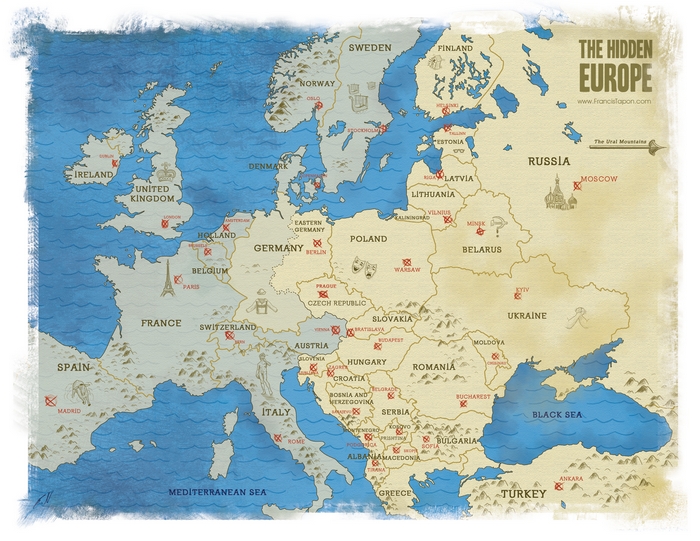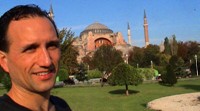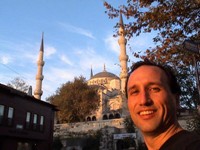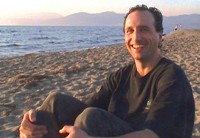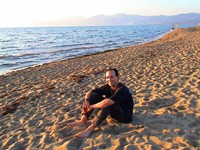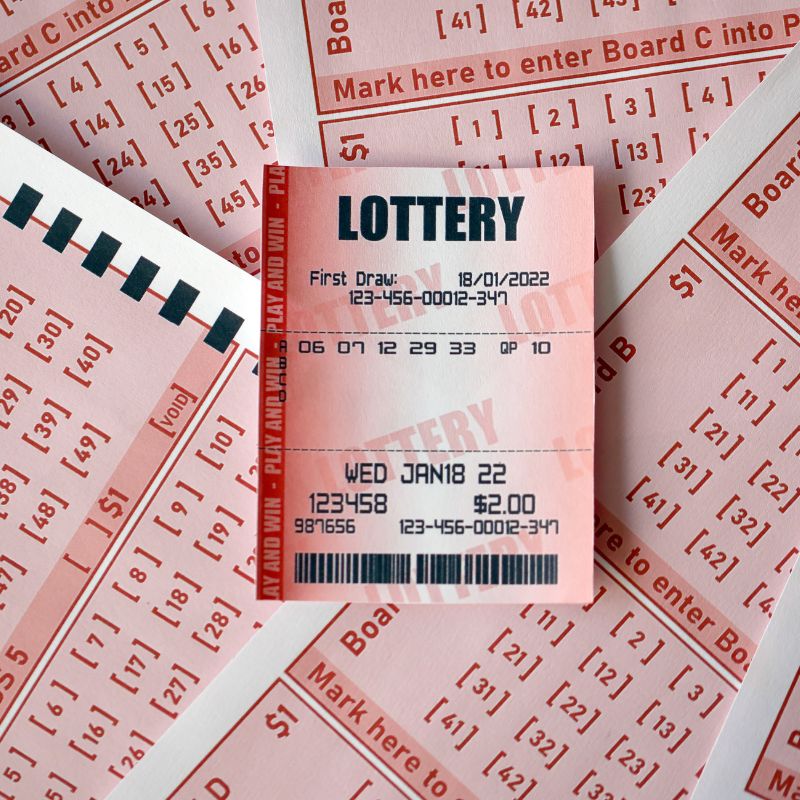Eastern Europe
Exploring the Hidden Europe in 2004 and 2008-2011
In 2004, I visited all 25 countries in Eastern Europe. You'll find the blog entries from that trip here. In 2008-2011, I returned to see what had changed since that time. With these two visits, five years apart, I accumulated enough material for my 750-page book, The Hidden Europe: What Eastern Europeans Can Teach Us.
This blog now has many excerpts from The Hidden Europe. But who the hell reads anymore? Just look at the best photos from Eastern Europe!
This map reflects how I define Eastern Europe. Eastern Europeans love to deny that they're in Eastern Europe. I tackle how and why I define Eastern Europe the way I do in the Introduction of The Hidden Europe.
Crossing the border between Moldova and Ukraine was as easy as I expected. That's right, it was a 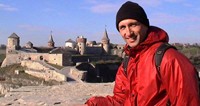
My favorite part was when they made us all get out of the bus at 3AM because the border police wanted to conduct an arbitrary "luggage inspection."
Fed up with their shenanigans I boycotted the inspection and stayed in the bus while all the Ukrainians suffered in the freezing temperatures. It was REALLY COLD. For those who know me well, you'll be surprised that I was not taking off my shoes in most places because it was so cold.
After ten minutes the bus driver finally ratted me out, so I joined my shivering comrades. I left my bag with all my cocaine inside the bus.
Meanwhile, I lugged my big bag filled with weapons of mass destruction to the end of the counter, pretending that I had already passed inspection. It worked. The customs agents ignored me and let us get back on board. They never checked any of the bags on the bus. Hey at least there's no discrimination: I was the most Arabic looking guy on the bus. Clearly, they didn't realize that I'm a Kazak.
Kazak = cossak 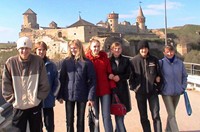
Kazak is a Turkish word which most Westerners pronounce “Cossacks.” It means “outlaw, adventurer, or free person.”
OK, I’m only an outlaw when I steal fruits from branches that hang over the street.
However, I'm not a real Kazak because I haven't helped establish the self-rule of any country. The Kazaks did this in the 15th century in Ukraine, thereby asserting the Ukrainian right for self-determination. Today that spirit lives strong in Western Ukraine. And that's where I was headed.
When I was planning this Eastern European tour I didn't expect to revisit countries I had already seen. But I already violated that concept when I went to the Austria, Czech Republic, and Hungary. If I skipped Ukraine, the largest country in Europe, it would be the only country in Eastern Europe that I didn't visit. That would be kinda rude.
It's a surprising fact, so I will repeat it: Ukraine is the biggest country wholly in Europe. Most Americans think that Europe ends around Germany and Italy, but officially it extends to the Ural Mountains (which are east of Moscow) and down to the Caucasus Mountains (northeast of Turkey). Although part of Russia is Europe, most of it is not, so it doesn't win the biggest country in Europe prize.
Elections this week 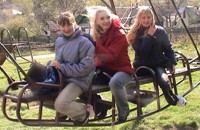
Besides, Russians don't consider themselves European anyway. They're Russians. A class by itself. Today about half of Ukraine wants to join the EU, while the other half wants a tighter relationship with Russia. The Ukrainian presidential election on Halloween should point which direction the country will go. Russians are scared the outcome won't favor them.
I hope it doesn't favor them and that Viktor Yushchenko wins. He wants Ukraine to join EU. His opposition favors getting cosy with Russia. Tune in on Halloween to see who wins. May the most corrupt man win.
Map of Ukraine
Use this map to navigate my confusing journey in this enormous country.
Start in the country of Moldova, which is jammed between Romania and Ukraine. I headed north to cross the border and went to enchanting Ukrainian town of Chernivtsi.
Freezing my ass off in Chernivtsi
I arrived in Chernivtsi at 5AM. I wanted to cry because it was so cold, but my tears would have frozen on my cheeks. I had six layers of clothing, one backpack on my back and another on my front, and I was walking uphill. And my teeth were still chattering.
I know it was a cold spell, but I didn't can't comprehend how all these people survive these winters. I couldn't even survive the fall!
A century and a half out of the Russian orbit have been kind to Chernivtsi. It has a graceful, cosmopolitan, Central European air. Its mixed history has bestowed upon it a wide variety of architectural styles, from Byzantine to Baroque, and the elegant streets of its old quarter are lined with grand, vine-covered facades. Tree-lined pedestrian avenues are lined with cafes, restaurants, and shops. A very different, very Ottoman world opens up in Chernivtsi's courtyards, which have wooden balconies and covered staircases. There is an Armenian Cathedral, a mid-19th century building with an interior meticulously painted. I can't believe that nobody talks about this city. It's gorgeous!
Meeting teenagers in a walled town 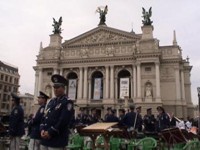
I hopped on a bus to Kamyanets-Podilsky which is about 25km (16mi) north of the point where Moldova and Romania meet at the Ukrainian border. It's called Khmel'nyts'kyy (its Ukrainian name) on the online map.
This old town has stood since at least the 11th century on a sheer-walled rock island carved out of the steppe by a sharp loop in the Smotrych River. It's a unique geography creates almost a natural moat. The south-western bridge, for centuries the only link between the town and the mainland, is guarded by a nine-towered stone castle that dates from the 16th century.
On its cobbled streets I asked 16 year old boy to take a picture of me. To my surprise, he spoke excellent Spanish. His father (who is from St. Petersburg) now lives in Spain. That was almost as weird as a Ukrainian man speaking Portuguese with me in some train station.
It wasn't long before a dozen of the teenagers joined in. We toured the castle together (we were practically the only tourists that chilly day). They had the day off from school and they were doing a field trip.
My maturity is regressing in this trip. I'm hanging out with such young kids because they're the only ones who speak a foreign language. So I'm making lots of jokes about farting.
Oh wait. Never mind. Maybe my maturity level hasn't really changed.
Ivano-Frankivsk 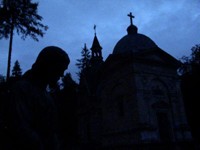
Another long bus ride later, I arrived in Ivano-Frankivs'k. It has four plazas and is set at the base of the Carpathian mountain range. Wow.
What's with these cities in western Ukraine that nobody knows about but that everybody should know about?
None are huge, but there's all extremely beautiful. They remind me of Prague and Riga.
After three elegant and regal cities, I was excited to see the highlight of western Ukraine: Lviv.
Lovely Lviv
Russians call it Lvov, but don't call it that in this nationalistic city. Lviv, the capital of western Ukraine, is a enchanting city. It reminded me of the Prague I saw 12 years ago. With a bit of renovation it will live up to its name: the Pearl of Europe.
Until 1939 it had never been ruled from Moscow, and it was here that Ukrainian nationalism re-emerged in the late 1980s. Having escaped the urban devastation of WWII, Lviv is a living museum of Western architecture from the Gothic to the present. And while there are plenty of Communist-era monstrosities, the old narrow streets and colourful historic core make it the best city in Ukraine and one of the best in Eastern Europe.
I visited Ukraine in 1999, but didn't see the western part. What a mistake. It's the best part! It's also home of the "real" Ukrainians.
Meeting the local Lvivians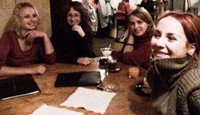
I had arrived Lviv early that morning and was leaving that same day. I had meticulously toured the city, including its cemetery, which is the most beautiful cemetery I've ever seen.
However, I felt a bit guilty because I hadn't mingled with the locals, a crucial component of my travel experience. But at 8PM my uncanny luck came through.
As I walked into the central square in Lviv my path crossed with an art student named Julia. I asked her to point me to an Internet cafe. She did, but she was curious to know where I was from. I told her I was from the Russian Liberation Army and I was here to free her from her silly Ukrainian traditions.
Within minutes another Julia joined us. She was a language specialist and spoke outstanding English. Next came Lena, who was sweet but spoke no English. Finally, wild Evelina arrived late as usual. Although she didn't speak English, I scolded her anyway.
I lamented my misfortune: I was stuck with four beautiful Ukrainian women. I did my best to run away, but they insisted on going out for coffee before I split to Kyiv in a few hours. With great reticence I acquiesced. But I'm glad I did because I learned about the country.
Ukrainian nationalism 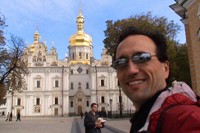
Unlike Belarus, there's at least one place in Ukraine where people speak their official language. Ukrainian is the default language in Western Ukraine, but is the second language after Russian in the rest of Ukraine. In the past 15 years, they've made a big push to promote this language which has a 70% overlap with Russian.
Although the girls said they would let me live this time for saying "thank you" in Russian, they encouraged me to learn how to say it in Ukrainian. Fortunately, all Ukrainians are fluent in Russian and are forgiving of ignorant Americans.
Many Ukrainians see Russians as fellow neighbors; however, western Ukrainians aren't big fans of Russians. They feel that Russia is the big brother who pats them on their head in a condescending fashion. However, even the worst Ukrainian-Russian tension looks like a love affair compared to the deep seeded Balkan hate. So don't expect any wars over this anytime soon, unless somebody drinks a bit too much vodka.
Tough history 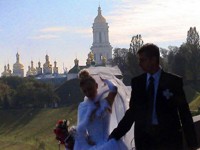
I always thought that Ukraine was a happy co-conspirator with Russia to establish Soviet dominance throughout the Eastern Bloc, like Austria worked with Germany to expand the Third Reich. Wrong.
After WWI and the collapse of Tsarist Russia, Ukrainians made a sloppy attempt at independence. Instead of having one coherent army to take on the Russians, they had six, each with their own agenda. Kyiv changed hands five times in one year. For their poor coordination, Ukraine ended up in the hands of four different countries. Nice going fellas.
In 1922 Stalin thought Ukraine would be a good lab rat for his Soviet plans. His first experiment was to see if he could obliterate Ukrainian nationalism. Instead he nearly obliterated the country. He engineered a famine in 1932-33 which killed millions in Ukraine.
And then WWII came, which killed six million Ukrainians and left the country in ruin.
So this might explain why many Ukrainians don't have great feelings for the Russians. And then came....
Chernobyl revisited 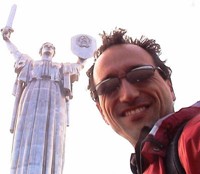
For those who remember my illegal field trip to the radioactive Chernobyl Exclusion Zone in Belarus, you’ll be glad to know that I decided not to visit it even though it’s just 100km (60 miles) from Kyiv.
But can you imagine the horror of watching nearly nine tons of radioactive material spew into the sky? To give you some perspective, that’s 90 times more powerful than the Hiroshima bomb.
Over five million people had the distinct pleasure of having radioactive fallout land on their heads.
Ten years ago Ukrainians were suffering an unbelievable 10,000% inflation. Five years ago their currency lost half of its value. Today things are better, but it’s still tough making a living when your average monthly wage is $61 or you only get a $30 pension.
Of course, things are cheap here and $61 goes a long way, but life isn’t THAT cheap. So corruption abounds as the economy stirs to life.
All this bad news makes it understandable that Ukrainians are heading for the exits and not reproducing. As a result, the population has been steadily declining since independence more than ten years ago.
Off to Kyiv (KIEV) 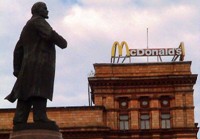
The Julias proudly said that Ukrainian hospitality is legendary. It's true. Ukrainians are warmer than Russians and one of the warmest people in Eastern Europe.
They demonstrated this hospitality by helping me get to train station, buy tickets to Kyiv, and find the proper platform. This may not sound like much, but in Ukraine it's a big production. Although we only spent a couple of hours together, they left me one of the best memories of this trip.
Kyiv revisited
For the few who know the capital of Ukraine, it’s pronounced (and now written) Kyiv and not Kiev (the Russian version). Say "Keev."
I'm embarrassed to admit that I missed a big portion of Kyiv when I was there five years ago. It makes me wonder what other stuff I've missed on this trip. Maybe I should go backwards and do all of Eastern Europe over again. And this time write even longer emails.
OK, maybe not.
Kyiv is a world class city that's worth seeing.
I spent two days there and then went to a city with a really long name...
Dnipropetrovs'k trail magic 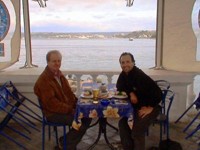
This city offers little to a tourist, but I had an interesting experience.
I was in a mini-bus when an Asian man entered. I was surprised to an Asian in this random Ukrainian city. I figured he was from eastern Russia. But then he started talking in English to his Ukrainian girl.
"Where are you from?" I asked, dying of curiosity.
"Los Angeles," the Asian man told me.
"Wow. What's the chance of two Californians sitting next to each other in Dnipropetrovs'k? What are you doing here?" I wondered.
"I teach English for the Peace Corps."
His name was Ed and the Ukrainian girl was called Nellie. Nellie demonstrated that fabled hospitality when she invited me to join them for lunch at a Spanish restaurant. This made for an interesting picture: eating a burrito with chips and salsa with a Asian man from LA and a Ukrainian woman in a random city called Dnipropetrovs'k. Weird.
Later that night Nellie invited me to join her and Justin (another Asian Peace Corps member) on a mellow night of town. At the end of the night Justin, who was from Dallas, invited me to crash on his floor.
I happily accepted his trail magic and was surprised by how humbling these Peace Corps people live. Maybe I've finally found a government program that is somewhat frugal.
Justin disrupted that short-lived hope when he said that the Ukrainian Peace Corps headquarters was pretty lavish. Well, it was fun while it lasted.
Krivoy Rog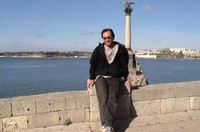
Everyone told me that Krivoy Rog sucked.
They're right. There's nothing touristy to see there. Next!
Odessa
Odessa is a curious mix of enticing seaside holiday retreat and polluted industrial port. Long the shipping centre of the Black Sea region and the major urban centre of southern Ukraine, the city is famous for its role in the 1905 revolution, when the mutinous battleship Potemkin Tavrichesky supported rebellious workers. Odessa's most famous sight, the massive Potemkin Steps, are nice but nothing that great. The city does have some fine architecture though.
The sandstone on which Odessa stands is riddled with about 1000km (620mi) of tunnels, known as the katakombi (catacombs). Quarried out for building in the 19th century, they have since been used by smugglers, revolutionaries and WWII partisans. In Nerubayske I visited a network of tunnels that sheltered partisans in WWII. Pretty cool side trip.
For no apparent reason the comfy train was sold out, so I had to take a 12 hour bus ride to the Crimea. No fun.
However, I got a lucky seating assignment and sat next to the only English speaking person on the bus: a Brit working for the British Council. Dave, a 40 year old man, has been living in Ukraine for three years. He later invited me to go clubbing with him.
Sunk ships in Sevastopol 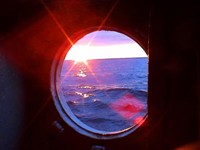
Sevastopol has a beautiful bay and was a scene of an unusual war strategy in the 19th century. A navy admiral realize that French and British would beat him in a fair fight, so he purposefully sank his entire fleet at the mouth of the bay!
Why? Because it would impede the enemy's ability to enter the harbor. The admiral and the citizens cried when they sank their own fleet. Today a memorial stands there.
Last night in Ukraine
For my last night in Ukraine Dave offered to take me to a dance club (it was Saturday night). This was my first club in five months of travel. It was worth the wait. The quality and quality of the eye candy was simply uncanny.
Crossing the Black Sea on boat
I had 30 hours to rest on the boat that will cross the mighty Black Sea. I needed it. My body was exhausted and couldn't shake a cold I had for 2 weeks.
The boat had about 80 Ukrainians. For $100 it was quite a deal, because they include a room with a bed (I shared with a Russian man), hot showers, two dinners and breakfasts, plus one lunch. Who cares if nobody on board could speak English?
Well, there were two German lesbians on the boat who could speak English, but they treated me about as nicely as most of the ticket agents at Belarusian train stations.
So I spoke with the Ukrainians in my catastrophic Russian. I can now communicate about as effectively as a 3 year old Russian boy. Maybe with 5 more years of practice I can communicate at the level of a 4 year old.
When I disembarked I entered my final destination, the gateway to Eastern Europe: Istanbul, Turkey.
The United States Ambassador to Macedonia, Lawrence Butler, looked at me with his crystal blue eyes and said, "There's a lot we can learn from Eastern Europeans."
"Like what?" I asked him.
"First, there's the importance of family. Macedonians, for example, always come back to their family. They don't understand when Americans go to college thousands of miles away and then don't return to their homes after they graduate."
"What else?"
"Macedonians are no more than one generation away from the farm. They all have relatives that are in rural areas that they visit during the holidays, for instance. This keeps their connection with the land."
"Are there any downsides to these values?"
"Sure. For example, the labor markets aren't very liquid, because people are unwilling to move far from their family. This prolongs economic downturns. Also, I remember hearing about these two farmers who were unwilling to talk to each other because their GREAT-GRANDFATHERS had an argument."
"Wow."
"Yeah. Nevertheless, Eastern Europeans can teach us many lessons."
I had the good fortune of being invited to Ambassador's Butler's house for a gathering to promote Macedonia folk art. I was surprised by the lax security. They didn't check my bag for the grenades and uzi I was carrying. They didn't ask for my passport or notice the bazooka on my back.
Although Ambassador Butler was understandably busy, it didn't stop me from cornering him. (OK, so I had to knock down a few of his aides to get him, but it was worth it.)
But my conversation with him helped crystallize my plans...
My book on Eastern Europe
I intend to expand Ambassador Butler's thoughts on what we can learn from Eastern Europe by writing a book about it. It's tentatively titled, "What America Can Learn From Eastern Europe."
I'm sure by the time the editors are through with it, they'll modify the title slightly and call it, "What Eastern Europe Can Learn from America."
But that's what I'm calling it for now.
Wisdom from Romania
A Romanian plastic surgeon shared a wise saying from Nicolae Iorga, a historian who appears on the Romanian currency:
"One voyage is worth 10 libraries."
After receiving all my emails, you might feel like I've written enough to fill 10 libraries.
But Iorga had a point. I have learned quite a bit in the last five months of travel though 22 countries.
I've learned....
- I've learned to use up all my currency before entering a new country.
- Cyrillic languages can tease you into thinking that you can read it, but you really can't.
- I've learned 22 different ways to say "hello", "thank you," "excuse me," and "where's the toilet?"
- I've learned that there are more men wearing white hats in Turkey than in Albania, and that most men don't wear any hat at all.
- I've learned to communicate with unfriendly and monolingual bus/train ticket vendors.
- I've learned to carry toilet paper everywhere.
- I've learned to make quick math calculations in my head when converting a dizzying number of currencies.
- I've learned that English has "no grammar" when compared to most Eastern European languages, but that spelling it is not exactly phonetic ("fonetic").
- I've learned that America still has the ugliest currency in the world.
- I've learned that squatting toilets (i.e., holes in the ground) are as popular in Eastern Europe as they are in Japan.
- I've learned to switch languages quickly so not to offend the neighboring country (who frequently hates the neighboring language).
- I've learned that most Eastern Europeans can wear almost no clothes in freezing weather and not be cold.
- I've learned that Turkish people can wear lots of clothes in hot weather and not sweat.
- I've learned that most people who work for bus and train lines haven't traveled anywhere.
- I've learned that Albania and Estonia really do exist.
- I've learned that it's smart to hold onto your camcorder very tightly when you're overlooking a cliff.
Eastern Europe's top 10
Visit Eastern Europe. It's an amazing region, comparable to Western Europe, and much cheaper too!
Here are my favorite spots:
1. Dalmation Coast in Croatia (Dubrovnik, Hvar, & Korcula)
2. Prague, Czech Republic
3. Krakow, Poland (with side trips to Salt Mines and Auschwitz)
4. Most of Romania
5. High Tatra Mountains in Slovakia
6. Baltic capitals (Vilnus, Riga, and Tallin)
7. Lviv (Lvov), Ukraine
8. Kotor Bay, Montenegro
9. Skocjan Caves, Slovenia
10. Budapest, Hungary
Most would put Budapest higher on the list. Lonely Planet has put it in the #1 spot for 4 years in a row. It is a great city. But I dislike the pollution and ever present cars. It's still worth checking out.
Lonely Planet has a clickable map that lets you poke into each country for details.
So you want more lists? Here you go....
Friendliest people
1. Turkey
2. Albania
3. Macedonia
Most underrated
1. Romania: Billed as a haven of thieves. The reality is that it's one of the best countries in Eastern Europe. Some of the best mountains and historical sights. Even the capital is like a little Paris. Super friendly people. Its Latin based language helps.
2. Montenegro: Supposed to be a war zone, but it's almost as nice as the Croatian Coast. Undiscovered.
3. Western Ukraine: Think this former communist country is a dump? Wrong. Go to western Ukraine and you'll find at least four splendid and mesmerizing cities. The people are wonderful too!
4. Warsaw: Many Poles told me not to go. It wasn't that great, but the old town was fantastic. Worth a stop if it's on the way.
Most overrated
Lake Ohrid: Listed in Lonely Planet's Top 10 Sites in Eastern Europe, it's on UNESCO's Heritage List, and is billed as the best lake in Eastern Europe. It probably IS the best lake in Eastern Europe, but when your competition is Lake Chernobyl that's not saying much.
Yes, Lake Ohrid is great, but just not THAT great. You should see it if you're around the area, but it's not worth a major detour.
Places to avoid
If you're one of those wimpy tourists who insist on having hot water, reliable electricity, and a low risk of being caught in a war zone, then there are a few places you might want to skip. Otherwise, every place I saw had something to offer and even the "dangerous" places are pretty tame.
The places with the least amount of traditional touristy places (e.g., Belarus and most of the Balkans) gave me some of my most fascinating cultural experiences. With few pretty things to look at, I discovered the people. This was usually tough because so few spoke English, but if you're persistent you'll find the 1 out of 100 who does.
The people from Belarus and the Balkans have lived through some extremely interesting times in the last few years. Listening to their rich (and frequently depressing) experiences makes the trip there worthwhile. And it sure feels good knowing that I'm beating the future mad rush of tourists to Kosovo.
Future of the Balkans
Check out the "Tension Index" on the upper right hand corner of this page.
You know the Balkans is not stable as long as they have such an index.
But I’m bullish about Croatia and Montenegro. Croatia’s Dalmatian Coast attracts hoards of tourists which will help fuel their rise. And for the first time, Montenegro didn’t fight along with the Serbs. They’ve adopted the Euro and have spectacular coastline they can leverage to generate massive tourist dollars.
But as for the other Balkan countries, their negativity is justified:
- Macedonia is waiting for its enemies to pick it apart.
- Albania will improve, but their poor reputation will hamper their growth for decades.
- Bosnia-Herzegovina has few resources to amount to anything.
- Serbia has a decent foundation thanks to the years of being the center of Yugoslavia, but a decade of civil wars has taken its toll and the country will struggle for a while.
- Kosovo is an economic deck of cards that will collapse as soon as NATO pulls out.
The future of the rest of the Eastern Europe
Except for a few regions in the Balkans, the future of Eastern Europe is bright. Although their average standard of living will lag behind Western Europe for at least 50 years, it's closing the gap. It's fun living in a place that keeps getting better. Nevertheless, some of the youth aren't interested in living through that process; others can't imagine it improving. They want out.
English = freedom
So many Eastern Europeans want the option of leaving their country, yet most don't do what it takes to make that happen. Most don't learn English (or any foreign language). If I dream of going to Germany, I would learn German no matter how much it tortures my ears.
I met so many people that (through translators) told me that they dream of going to America. If their friends could learn English, why didn't they? I know it's not easy, but I met plenty of people of humble means who pulled it off. Hell, even I learned enough Russian in just a couple of weeks that I could communicate for more than an hour with Ukrainians who spoke zero English. OK, so I used lots of hand signals, an ad-hoc form of Pictionary, and only had a 37% comprehension rate, but still...
The customer service gap
It was surprising to see the friendly smiles when I returned to the United States. Eastern Europeans criticize Americans of being fake. Yeah? Well I don't care. I love those fake smiles and phony cheerful greetings.
Besides, it sure beats the alternative, which is what I got in most of Eastern Europe's establishments: a scowl with an occasional grunt.
I still remember when a Bulgarian waitress told me that I should probably go have dinner somewhere else because the kitchen was "very busy." Only 30% of the seats were taken.
Many times in Eastern Europe I had to practically beg people to take my money in exchange for a service. It's all part of a massive communist hangover. But it's getting better. For example, I'll never forget the Moldovan border guard who actually smiled at me. I was so surprised that I wanted to kiss her! (And no, she wasn't hot.)
People don't yell at me anymore
Now that I'm back in the US, people talk to me in a normal voice. When Eastern Europeans were unable to communicate with me they frequently resorted to screaming, thinking that it helps with my comprehension. Example:
Someone would say to me, "xxxx yyyy zzzz."
"I'm sorry I don't understand."
"XXXX YYYY ZZZZ!!!!!!!!!"
"Oh, OK, thanks for yelling. Now I understand completely."
The rude awakening
Within days of returning to America, I flew to Seattle for a shocking transition. Today I'm working for the richest homo sapien in the universe. OK, so there's about 3,143 levels of management between Bill Gates and I, but ultimately he is my boss.
I'm working on a business intelligence project. No, that's not an oxymoron. These Microsoft folks do know a little bit about business. Bill is, after all, a BILL-ionaire.
"If you can count your money, you don't have a billion dollars." - John Paul Getty
So what am I really doing at Microsoft? I'm working to tie Microsoft's corporate goals with the appropriate metrics in the Operations department, thereby creating a virtual dashboard that the executives can use to gauge the health of the business.
(If you understood what the hell I just wrote, then you're doing better than me.)
Living near Seattle is a bit weird after many months in Eastern Europe. I'm not sure what's more strange for me:
(a) Walking around with a Tablet PC that reads my terrible handwriting perfectly and allows me to wirelessly surf the Internet whenever I am within sight of the Microsoft campus.
(b) Readjusting to the concept of being literate again.
For nearly 5 months I had no clue what most people were saying or what was written anywhere. I was an alien. Suddenly, I can no longer play dumb when the bus driver asks me why I haven't paid the correct fare.
What's the next adventure?
Within moments of returning to the United States my friends were already wondering when I will go on my next adventure. I'm not sure how to interpret this. Does this mean they're eager to see me leave again?
Perhaps. But they also know me well. I agree with Hellen Keller, who said, "Life is either a daring adventure or nothing."
So I'm not retiring my passport or my backpack. My next adventure may be:
- Thru-hiking the Pacific Crest Trail
- Spending 6-12 months in Africa, exploring every country on the continent
-
Fixing up a house in Kotor, Montenegro
Gosh, that last one sounds terribly domestic. What the hell is wrong with me? Next thing you know I'll get a wife, have 4 kids, and land a steady job.
Yeah I know that's unlikely, but it might be cool being the US Ambassador to Montenegro....
I'm feeling pretty good about myself. No, it's not that I just completed five months of traveling in 22 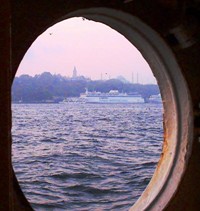
But the main reason I'm feeling great is that so many Turkish men are really good looking.
No, I haven't become gay.
It's just that throughout my Eastern European voyage people have thought that I am Turkish.
Before I visited Turkey I just shrugged off that incorrect guess and simply revealed my Chilean/French origin. But now I wear that incorrect guess as a badge of honor. After all, Turkish men are hot!
Turkish looks
You crave the dark, handsome man? Come to Turkey.
You prefer blondes? Maybe Scandinavia is a better fit.
For the first time in my trip, the good looking men outnumbered the good looking women. Eastern European is filled with attractive women, especially in the Baltics and Ukraine. But in Turkey good looking guys are abundant and women are, well, absent.
It's not that Turkish women are ugly. It's just that they're not on streets. I'm not sure where they're hiding, but over 80% of the pedestrians are men.
So I was strutting my stuff and feeling pretty Turkish, when a Turkish rug vendor stopped me and said, "Can I ask you something?"
"Yes."
"Where are from?" he asked.
"Guess," I said.
"France."
My smile vanished.
Crap.
I guess I really don't look Turkish after all.
I'm just another smelly Frenchman.
Sensory assault
Speaking of smells, Istanbul attacks your senses.
I was in Istanbul during Ramadan, which this year lasts from October 15 to November 12. During this period Muslims fast, don't smoke or drink alcohol. At least during the day. During the night there's probably an orgy of cigarettes and food in every home as they try to make up for lost time.
I thought I'd see mellow version of Istanbul, but it still managed to assault my senses:
- People touch and grab you when they're giving you directions, practically pulling you in the correct direction.
- The smell of succulent food wafts into your nose, which must be torture to the 90% who observe Ramadan.
- The din of the street vendors shouting their best offers is omnipresent.
- The Arabic architecture delights the eyes.
- The taste Turkish spices sends your palate into 7th heaven.
I was overwhelmed.
Nicest people ever 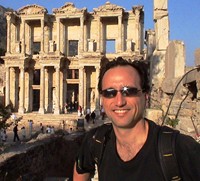
After traveling over 60 countries, I'd put Brazilians and the Irish on the short list of some of the nicest people around. But the Turks trounce them all. They are without a doubt, the warmest people I have ever met.
It was almost scary how nice they are. Many times I had to look around to make sure I wasn't on the Truman Show.
For example, I asked one guy where the Hagia Sofia Mosque was, and he said, "Let me take you there."
He took me on a 10 minute walk around the center, chatting the whole way. He owned a clothing store and liked relaxing near the mosques when he had free time. I was sure he would ask me for money at the end of his little tour. He dropped me off in front of the museum and said, "OK, here you are. I'll wait for you here when you come out."
"Um, that's OK. I'm fine. Thanks!"
"OK then! Bye bye!"
I felt bad. I was kinda cold to him at the end. I thought he wanted my money, but he never even hinted for it. A cynic may say that he really did want my money, but after meeting dozens of helpful Turks, I conclude that he was just a REALLY nice guy.
The Hagia Sofia was impressive. The Blue Mosque, which is right next door, was also spectacular.
But one of my favorites was the Basilica Cistern.
Built in the 6th century, during Istanbul's glory days, this cistern still works.
Overnight train to Ephesus 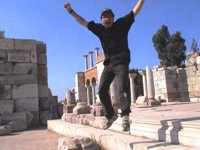
I left Istanbul via an overnight bus trip. What a difference between the Turkish buses and the Eastern European ones I had been taking for several months! This bus had comfortable reclining chairs, trays, a mo
vie (appropriately "Troy", with Brad Pitt), headphones, free food and drink, and (the real shocker) friendly bus drivers!
I arrived in the ancient Roman city of Ephesus. It is arguably the largest Roman ruin in the world and yet it's only half excavated. It's hard to imagine that 2,000 years ago the Aegean Sea filled the valley so ships could dock in Ephesus.
The Turkish government is now digging a channel to the sea. Soon visitors will be able to arrive once more by boat.
While Greek legend says that Amazons, the mythical female warriors, founded Ephesus, I think it's more likely that Androklos was responsible. On the other hand, the story on how he chose the site is a bit fishy.
Supposedly he consulted the Oracle at Delphia, who told him that a fish would show Androklos the place for a new colony and a boar would lead them to the future site of Ephesus. While preparing a fish dinner, along the shore of the Aegean, the fish jumped out of the pan. Startled, the cook caused a brush fire, which in turn startled a boar. Androklos followed the boar and eventually killed it. There became the site where Ephesus was built. The fact that there was a good harbor area, fertile land nearby, and a fresh-water stream available might have also helped.
It was exciting to walk in the footsteps of the impressive cast of characters who have walked through its streets. Here's some of them:
- ALEXANDER THE GREAT conquered Ephesus and offered to help complete the Temple of Artemis (one of the Seven Wonders of the World). The builders turned down his funding because Alex wanted his name carved in big fat letters on the Temple in exchange for the cash. To not offend Alex, the Ephesians cleverly said that it was not fitting for one god to dedicate a temple to another.
- JULIUS CAESAR visited Ephesus while he was chasing Pompey the Great.
- After losing the fight for the Egyptian throne to her sister Cleopatra, ARSIONOE fled to Ephesus where she lived like a queen in the Temple of Artemis. Cleopatra eventually convinced Mark Anthony, her lover, to kill her sister there. With family members like this, who needs enemies...
- In 32 BC, QUEEN CLEOPATRA AND MARK ANTHONY got busy in Ephesus. Anthony was assembling his forces against Octavian. The troops disliked her presence and their morale plummeted. During the fight Cleopatra fled faster than a French general, taking her sixty Egyptian ships with her. Anthony followed her in a single ship, leaving the rest of his fleet to be destroyed. With commanders like this, who needs enemies...
- The VIRGIN MARY accompanied the APOSTLE PAUL here towards the end of her life, circa 37-45 AD. In his third visit, Paul almost caused a riot with the pagan idol sellers. After two years of living there, they gave Paul the boot. However, he still managed to establish a center for Christianity there.
- ST. JOHN wrote his Gospel on a hill in Ephesus. A big church was built there and I visited the ruins. (St. John wrote the Book of Revelation on the island of Patmos.)
- FRANCIS TAPON roamed the streets of Ephesus in 2004 where he eavesdropped on various multilingual tours because he was too cheap to pay for one.
Men never change 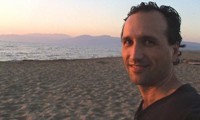
When I saw admiring the Celcus Library I learned that men haven't changed much. Next to the library was a brothel. An underground tunnel connected them. So men told their wives that they were "going to library" to "pull an all-nighter."
Technically they weren't lying, but...
Temple of Artemis
The 7th wonder of the world in Ephesus sure looked nice back then.
But today, there's not much to see.
What little there is can be found in the British Museum, which Turkish tour guides are extremely bitter about.
In 1863 the British Museum sent John Turtle Wood, an architect, to search for the temple. Wood met with many obstacles. The region was infested with bandits. Workers were hard to find. His budget was too small. Oh, and he had no clue where the temple was located.
He searched for the temple for six years. Each year the British Museum threatened to cut off his funding unless he found something significant, and each year he convinced them to fund him for just one more season. Mr. Wood probably told his funders that he had to conduct "more research" in the "library."
OK, c'mon it really wasn't easy. During his first season he was thrown from a horse, breaking his collar bone. Two years later he was stabbed within an inch of his heart during an assassination attempt upon the British Consul in Smyrna. And by his fifth year I'm sure he really missed the London weather.
Finally in 1869, at the bottom of a muddy twenty-foot deep test pit, his crew struck the base of the great temple. Wood then excavated the whole foundation removing 132,000 cubic yards of the swamp to leave a hole some 300 feet wide and 500 feet long. The remains of some of the sculptured portions were found and shipped the to British Museum.
Overnight trip back
The bus trip back wasn't as nice as the trip there:
1) There was one screaming child in the seat across from me.
2) When the child finally fell asleep from its screaming fit at midnight, the mother began talking loudly all night with the bus driver's assistant. You'd think she would exhausted from her child's tantrums, but I guess not.
3) What was really odd was that at 2AM they turned on all the lights of the bus and started passing out caffeinated tea and crackers.
Huh?
I was surprised that not only nobody got pissed off for being rudely awakened and that they got so many takers. I really don't understand this. Do all Turkish people set their alarms at 2AM to get out of bed and have some tea and biscuits?
Job offer from Microsoft
About two months ago a friend of mine in Microsoft asked me to help him on a project he was working on. While I was in Turkey we finalized the deal. I was to fly to Microsoft as soon as possible.
Therefore, my plan was to return to the US on Oct 29, shake off jet lag, read 5 months of mail, vote for a bunch of libertarian candidates on Nov 2, jump on a plane to Seattle on Nov 3, and start working for Microsoft on Nov 4.
Although it's not clear how long the consultant gig will last, I figured it was a good opportunity to get rained on for a few months in Seattle.
The five months of travel ends in Istanbul 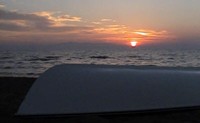
After a 12 hour bus ride, I jumped on a 15 hour plane flight to San Francisco (with a stop in New York). It was appropriate that I ended my trip in Istanbul, because it is the gateway to Eastern Europe.
It's always an emotional experience to go through passport control when I return to the United States, and after 5 months in Eastern Europe, this time was no different.
I smiled at the Passport Control Officer and said, "I love traveling, but when I return to the US I always want to kiss the ground."
"I know what you mean," he told me. "I wasn't born here, but I'll never go back to live in Argentina. I love America."
Yes, the United States has many flaws, but when you consider the alternatives, it's hard to beat.
I'll keep exploring, but America will always be my base camp.
Your comment will be deleted if:
- It doesn't add value. (So don't just say, "Nice post!")
- You use a fake name, like "Cheap Hotels."
- You embed a self-serving link in your comment.
